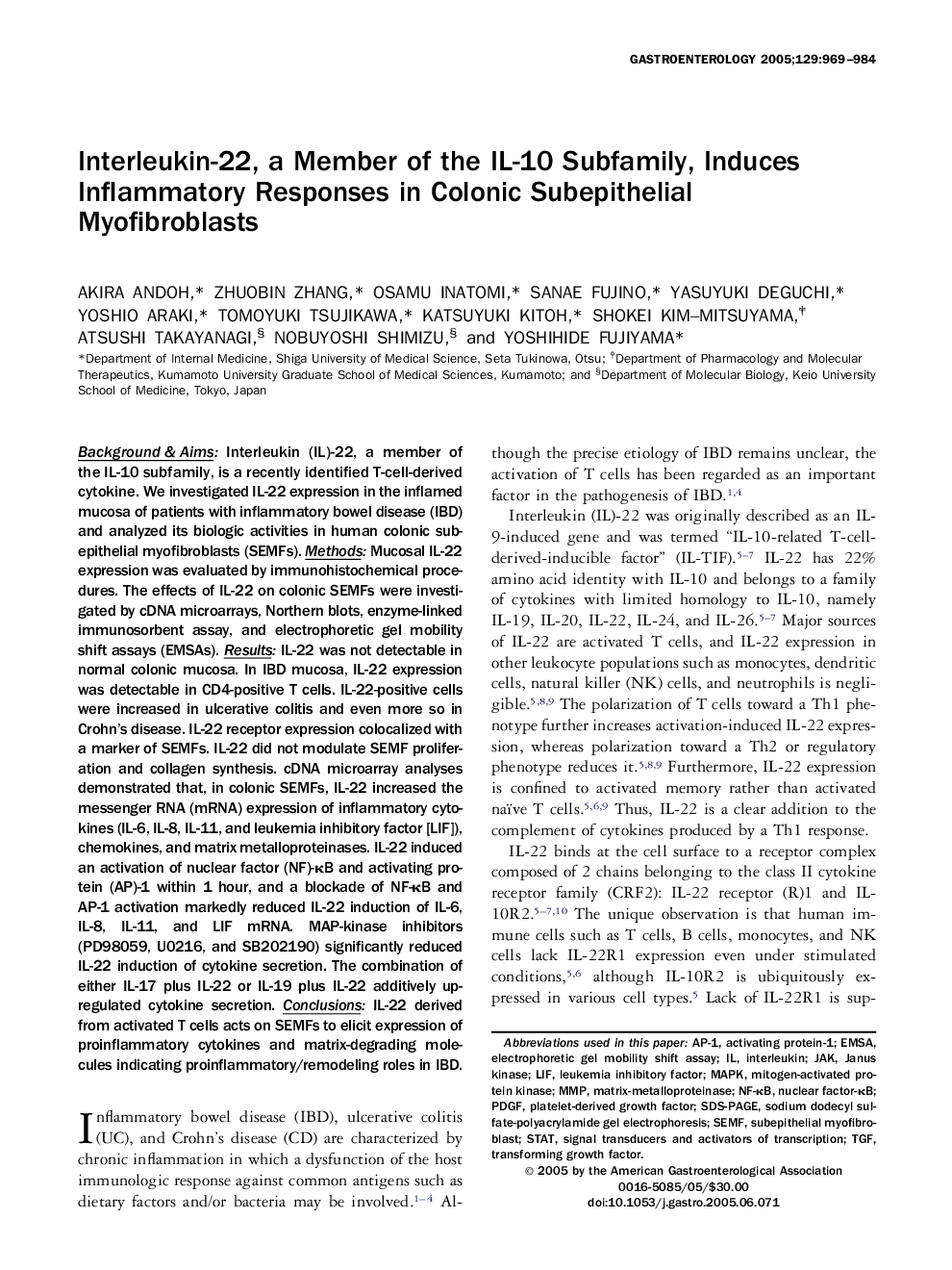| Article ID | Journal | Published Year | Pages | File Type |
|---|---|---|---|---|
| 9244218 | Gastroenterology | 2005 | 16 Pages |
Abstract
Background & Aims: Interleukin (IL)-22, a member of the IL-10 subfamily, is a recently identified T-cell-derived cytokine. We investigated IL-22 expression in the inflamed mucosa of patients with inflammatory bowel disease (IBD) and analyzed its biologic activities in human colonic subepithelial myofibroblasts (SEMFs). Methods: Mucosal IL-22 expression was evaluated by immunohistochemical procedures. The effects of IL-22 on colonic SEMFs were investigated by cDNA microarrays, Northern blots, enzyme-linked immunosorbent assay, and electrophoretic gel mobility shift assays (EMSAs). Results: IL-22 was not detectable in normal colonic mucosa. In IBD mucosa, IL-22 expression was detectable in CD4-positive T cells. IL-22-positive cells were increased in ulcerative colitis and even more so in Crohn's disease. IL-22 receptor expression colocalized with a marker of SEMFs. IL-22 did not modulate SEMF proliferation and collagen synthesis. cDNA microarray analyses demonstrated that, in colonic SEMFs, IL-22 increased the messenger RNA (mRNA) expression of inflammatory cytokines (IL-6, IL-8, IL-11, and leukemia inhibitory factor [LIF]), chemokines, and matrix metalloproteinases. IL-22 induced an activation of nuclear factor (NF)-κB and activating protein (AP)-1 within 1 hour, and a blockade of NF-κB and AP-1 activation markedly reduced IL-22 induction of IL-6, IL-8, IL-11, and LIF mRNA. MAP-kinase inhibitors (PD98059, U0216, and SB202190) significantly reduced IL-22 induction of cytokine secretion. The combination of either IL-17 plus IL-22 or IL-19 plus IL-22 additively up-regulated cytokine secretion. Conclusions: IL-22 derived from activated T cells acts on SEMFs to elicit expression of proinflammatory cytokines and matrix-degrading molecules indicating proinflammatory/remodeling roles in IBD.
Keywords
MMPEMSALIFSEMFPDGFTGFAP-1NF-κBJanus kinaseMAPKSTATsodium dodecyl sulfate-polyacrylamide gel electrophoresisSDS-PAGEinterleukintransforming growth factorleukemia inhibitory factorplatelet-derived growth factornuclear factor-κBactivating protein-1matrix-metalloproteinasesignal transducers and activators of transcriptionmitogen-activated protein kinaseJAK
Related Topics
Health Sciences
Medicine and Dentistry
Gastroenterology
Authors
Akira Andoh, Zhuobin Zhang, Osamu Inatomi, Sanae Fujino, Yasuyuki Deguchi, Yoshio Araki, Tomoyuki Tsujikawa, Katsuyuki Kitoh, Shokei Kim-Mitsuyama, Atsushi Takayanagi, Nobuyoshi Shimizu, Yoshihide Fujiyama,
